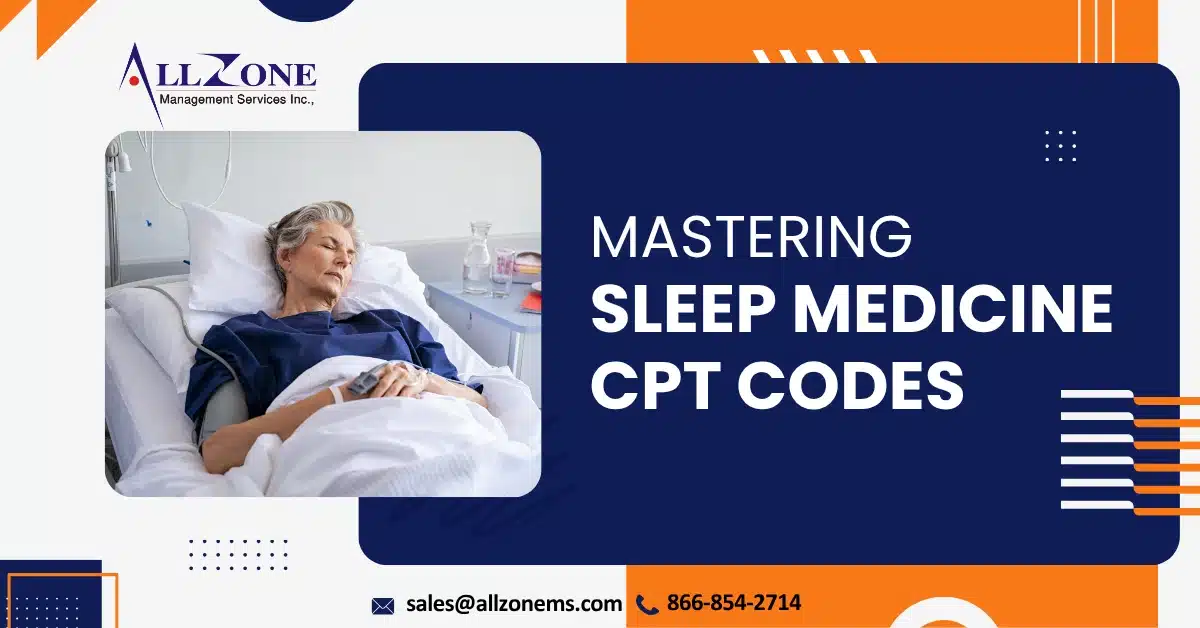Sleep medicine has grown into a vital specialty in modern healthcare, helping patients manage disorders such as sleep apnea, insomnia, narcolepsy, and restless legs syndrome. With millions of Americans experiencing sleep-related issues each year, healthcare providers are performing more diagnostic and therapeutic procedures in this field. However, accurate billing for sleep studies can be complex due to the wide range of Sleep Medicine CPT codes used for testing, evaluation, and management.
For providers and billing professionals, understanding the correct use of CPT codes in sleep medicine is critical for ensuring compliance, preventing denials, and maximizing reimbursement. At Allzone Management Services, we specialize in simplifying medical billing and coding for practices across specialties, including sleep medicine.
In this blog, we’ll cover everything you need to know about Sleep Medicine CPT codes—what they are, commonly used codes, documentation tips, best practices, and the benefits of outsourcing your billing to experts.
What Are Sleep Medicine CPT Codes?
Current Procedural Terminology (CPT) codes are standardized codes maintained by the American Medical Association (AMA). They are used to describe medical, surgical, and diagnostic services provided to patients.
In sleep medicine, CPT codes identify procedures such as overnight polysomnography, home sleep apnea testing, multiple sleep latency testing, and other diagnostic or therapeutic services. Insurance payers rely on these codes to determine reimbursement, making it crucial for providers to use the most accurate and updated code for each service.
Commonly Used Sleep Medicine CPT Codes
Sleep studies are classified based on the type of test performed, the setting (in-lab or home), and the number of parameters recorded. Below are some of the most commonly used sleep medicine CPT codes:
Polysomnography (In-Lab Sleep Studies)
- 95810 – Polysomnography, sleep staging with four or more additional parameters of sleep, attended by a technologist.
- 95811 – Polysomnography with CPAP (Continuous Positive Airway Pressure) or BiPAP titration, attended by a technologist.
Home Sleep Apnea Testing (HSAT)
- 95800 – Sleep study, unattended, simultaneous recording of heart rate, oxygen saturation, respiratory analysis, and sleep time.
- 95806 – Sleep study, unattended, recording respiratory effort, airflow, and oxygen saturation.
Multiple Sleep Latency Testing (MSLT) and Maintenance of Wakefulness Test (MWT)
- 95805 – MSLT to measure daytime sleepiness (used to diagnose narcolepsy).
- 95807 – Sleep study, attended, recording fewer parameters than full polysomnography.
Other Related Codes
- 94660 – CPAP initiation and management.
- 94662 – CPAP device fitting and training.
These codes are frequently used, but proper coding also depends on documentation, payer requirements, and the medical necessity of the procedure.
Best Practices for Sleep Medicine Coding
Accurate coding in sleep medicine requires more than just knowing the codes—it requires attention to detail, compliance, and documentation. Here are some best practices:
- Understand Payer Policies: Insurance payers may have different rules for in-lab versus home sleep studies. Some require prior authorization for certain tests, while others may only reimburse for HSAT as a first step before approving in-lab testing.
- Link Diagnosis Codes Correctly: Always pair the procedure code with the appropriate ICD-10 diagnosis code, such as 33 (Obstructive sleep apnea, adult) or G47.10 (Hypersomnia, unspecified). Incorrect or mismatched diagnosis codes often lead to denials.
- Ensure Proper Documentation: Documentation should clearly state the reason for the study, medical necessity, type of test performed, and parameters recorded. For polysomnography, the presence of a technologist must be noted.
- Avoid Upcoding or Undercoding: Using a higher-level CPT code without supporting documentation can trigger audits. On the other hand, undercoding leads to revenue loss. Accurate coding ensures compliance and financial stability.
- Stay Updated on Coding Changes: CPT codes are regularly updated by the AMA. Staying informed about revisions ensures continued compliance and accurate claims submission.
Common Challenges in Sleep Medicine Billing
Even experienced providers face challenges in billing for sleep studies. Some common issues include:
- Frequent Claim Denials: Often caused by missing documentation, wrong CPT/ICD-10 combinations, or payer policy restrictions.
- Prior Authorization Delays: Many payers require approval before sleep studies, especially for in-lab testing.
- Complex Coding Rules: Different payers have varying guidelines for what qualifies as medically necessary.
- Patient Financial Responsibility: With high deductibles and copays, patients often delay or refuse testing, impacting provider revenue.
The Impact of Coding Errors in Sleep Medicine
Incorrect use of Sleep Medicine CPT codes can have significant financial and compliance consequences, including:
- Denied claims and delayed reimbursement.
- Increased administrative burden due to resubmissions and appeals.
- Risk of audits and penalties for repeated coding errors.
- Loss of revenue and reduced profitability for sleep clinics.
Why Outsource Sleep Medicine Billing to Allzone?
At Allzone Management Services, we understand the unique billing challenges faced by sleep medicine providers. Our team of certified coders and billers ensures:
- Accurate CPT & ICD-10 Coding – We assign the correct codes based on documentation and payer rules.
- Denial Prevention – Our proactive approach reduces errors and improves first-pass claim acceptance rates.
- Compliance Assurance – We stay updated with the latest coding regulations and payer policies.
- Revenue Optimization – By eliminating undercoding and avoiding denials, we maximize your reimbursement.
- End-to-End RCM Support – From charge entry to payment posting and denial management, we streamline the entire revenue cycle.
With our expertise, providers can focus on delivering high-quality sleep care while we handle the complexities of billing and coding.
Final Thoughts
Sleep medicine plays a crucial role in diagnosing and treating disorders that impact overall health and quality of life. However, billing for these services can be challenging without a thorough understanding of Sleep Medicine CPT codes.
By following best practices, ensuring compliance, and partnering with experts like Allzone, healthcare providers can minimize denials, improve reimbursement, and streamline their revenue cycle.
If your practice is struggling with complex billing processes or frequent claim denials, it may be time to outsource to a trusted medical billing company. At Allzone, we provide tailored solutions for sleep medicine providers to achieve financial stability and focus on patient care.

